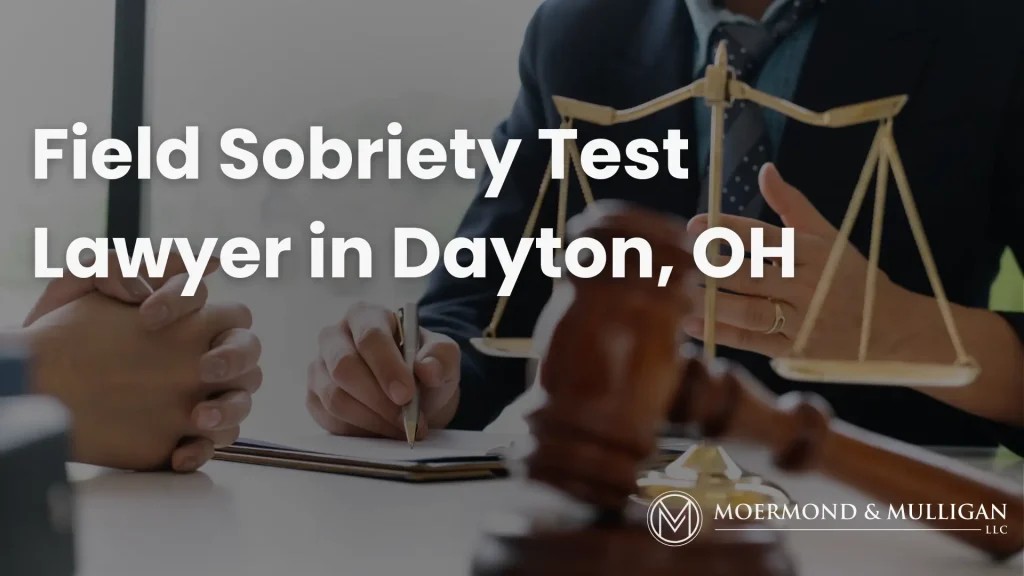
How A FST Can Hurt Your DUI Case in Dayton
When an officer pulls over a driver on suspicion of DUI, they may ask the driver to step out of their vehicle and perform a series of tests. These tests, which have been designed by the National Highway Transportation Safety Administration (NHTSA), were designed to provide officers with evidence of a person’s alleged level of intoxication.
However, the truth of the matter is that these tests set the driver up for failure no matter what. And because they are not backed by science, they have not been proven reliable. Furthermore, any deviation from how the tests are written and approved by the NHTSA means that the results may not even be valid at all.
Discuss your results with our team today in a free consultation or call Dayton field sobriety test lawyer at (937) 228-9790.
What Is a Field Sobriety Test?
Field sobriety tests refer to various physical and mental tests that police officers may ask drivers stopped on suspicion of intoxicated driving to perform on the roadside. They allow a police officer to assess a driver’s potential impairment from alcohol or drugs. Field sobriety tests challenge drivers’ ability to handle physical and mental tasks simultaneously and display a driver’s coordination and balance, which alcohol or drug intoxication can adversely affect.
Types of Field Sobriety Tests
The National Highway Traffic Safety Administration has developed three “standardized” field sobriety tests, which the agency claims provide the most reliable indicators of alcohol and drug intoxication. These tests include:
- The Horizontal Gaze Nystagmus Test: In the Horizontal Gaze Nystagmus (HGN) test, a driver must follow an object, such as a pen or the officer’s finger, with their eyes while the officer monitors the driver’s eye movements to detect any eye movements characteristic of intoxication, such as lack of smooth movement or involuntary eye movement/twitching.
- The Walk-and-Turn Test: In the Walk-and-Turn, a driver must walk heel to toe in a straight line. The test allows a police officer to monitor a driver’s balance and coordination while testing their ability to follow directions and remember a series of steps while simultaneously performing mental and physical tasks. The officer will look for movements characteristic of intoxication, such as stepping off the line or using one’s arms to keep balance.
- The One-Leg Stand Test: In the One-Leg Stand test, a driver must stand on one leg for 30 seconds, allowing the officer to look for characteristic signs of intoxication, such as swaying, using arms to keep balance, hopping, or putting their foot down before instructed to do so.
Other non-standard field sobriety tests with less compelling evidence of reliability include:
- The Romberg Test: A person must stand feet together, head tilted back, with their eyes closed for approximately 30 seconds while the officer observes any signs of swaying of the person’s body.
- The Finger-to-Nose Test: A person tips their head backward, closes their eyes, and attempts to touch the tip of their nose with each index finger.
- The Alphabet Test: A person must receive part or all of the alphabet, either forwards or backward, at the officer’s instruction.
- The Finger Count Test: A person must touch each finger of their hand to their thumb while counting up from one to four and then down from four to one.
- The Counting Test: The person must count backward from a number ending in other than zero or five and stop at a number ending in other than zero or five, counting through at least 15 numbers.
Under Ohio law, a police officer may only testify about a driver’s performance on the standard field sobriety tests established by the NHTSA.
Field sobriety tests may also include using a portable, handheld breathalyzer, which purports to measure a person’s alcohol intoxication based on the presence of alcohol molecules in their breath.
Do You Have to Take a Field Sobriety Test?
When a police officer asks you to step out of your vehicle to perform field sobriety tests, they may make it seem like you cannot refuse the tests. However, drivers have the right to refuse to submit to field sobriety tests. An officer who asks a driver to perform field sobriety tests already suspects the driver of OVI and needs more evidence to develop probable cause to arrest the driver. Ohio’s implied consent law only requires a driver to submit to chemical testing following a valid OVI arrest. Thus, agreeing to perform field sobriety tests will only give the officer more evidence they can use to prosecute you for OVI.
However, refusing a field sobriety test does not necessarily mean that you will avoid an arrest. A police officer may gather other evidence that gives them probable cause to believe that you’ve operated a vehicle under the influence of alcohol or drugs, such as displaying signs of intoxication like an odor of alcohol, slurred speech, swaying, or glassy, bloodshot eyes. When a driver appears under the influence of alcohol or drugs, their appearance may give an officer sufficient evidence to form probable cause to arrest the driver for OVI.
What Happens If You Refuse a Breathalyzer in Ohio?
You will not face any consequences if you refuse a portable breathalyzer during a traffic stop. However, a refusal may raise the officer’s suspicions and lead them to further investigate for a potential OVI arrest. Suppose you refuse a breathalyzer test at the police station after an OVI arrest. In that case, you will face consequences even if you avoid a conviction for OVI, including an administrative suspension of your driver’s license. The length of the license suspension imposed for a chemical test refusal will depend on the number of prior incidents of refusal by a driver within the past ten years. Drivers must serve a minimum portion of their suspension before they may petition for a limited restoration of their driving privileges. Administrative suspension periods for chemical test refusals include:
- First refusal: One-year suspension, with eligibility for a limited driver’s license after 30 days’ suspension
- Second refusal: Two-year suspension, with eligibility for a limited driver’s license after 90 days’ suspension
- Third refusal: Three-year suspension
- Fourth or subsequent refusal: Five-year suspension
A driver can appeal an administrative suspension of their driver’s license for a chemical test refusal by proving that:
- The arresting officer lacked reasonable grounds to believe that the driver had committed an OVI or OVUAC violation or exercised physical control of a motor vehicle in violation of a municipal OVI ordinance
- The arresting officer did not request a chemical test
- The arresting officer failed to inform the driver of the consequences of taking or refusing a chemical test, the consequences of a refusal for a driver with multiple OVI convictions, or in the event of refusal, the officer could use whatever reasonable means necessary to ensure the driver’s compliance with testing
- The driver did not refuse a request for a chemical test
When Is a Field Sobriety Test Used by Law Enforcement Officers?
A police officer may use a field sobriety test if they suspect a driver of alcohol or drug intoxication. Field sobriety tests help law enforcement officers develop probable cause to arrest a driver for OVI, after which the officer can demand the driver submit to chemical testing to verify their intoxication. An officer may ask a driver to perform field sobriety tests if the officer pulled the driver over for driving behaviors characteristic of intoxication, such as inability to stay in the lane, weaving, or failing to keep a consistent speed or keep pace with traffic, or if the officer notices signs of intoxication in the driver’s appearance or behavior. Officers may also perform field sobriety tests during OVI/DUI checkpoints in Dayton.
How to Beat a Field Sobriety Test Charge in Dayton, OH
A “failed” field sobriety test does not mean the prosecution has an unbeatable criminal case against you. Drivers can present various defenses to undermine the strength of field sobriety test results in an OVI case. A field sobriety tests lawyer in Dayton can help you beat an OVI charge based on your field sobriety test results by challenging the reliability of the test results in various ways, such as:
- Highlighting the officer’s deviation from testing protocols: A police officer must administer the standardized field sobriety tests promulgated by the National Highway Traffic Safety Administration according to the testing protocols established by the agency. Any deviation from testing protocols may undermine the reliability of the test results.
- Highlighting adverse environmental factors: Various environmental conditions can adversely affect a driver’s performance on field sobriety tests. For example, uneven grounds may cause a driver to stumble or sway during field sobriety tests. High winds or heavy precipitation can also affect a driver’s performance. Poor lighting may disorient a driver, making it more challenging for them to perform the tests.
- Highlighting the driver’s medical conditions: Various medical conditions can affect a driver’s performance on field sobriety tests. For example, conditions like arthritis in leg joints or inner ear conditions may cause a driver to stumble, sway, or otherwise “fail” standard field sobriety tests.
- Highlighting the driver’s lack of English proficiency: A driver may argue that their lack of English proficiency affected their performance of field sobriety tests if the officer could not give instructions in the driver’s preferred language and the driver had trouble understanding instructions in English.
Drivers may challenge an OVI arrest based on an officer’s use of non-standard field sobriety tests. Although non-standard tests already have questions about their reliability, various factors can further adversely affect their reliability, such as the officer’s lack of training to administer the test, environmental conditions, a driver’s health conditions, or a driver’s non-proficiency in English.
Drivers can pursue other defense arguments to fight an OVI charge in Dayton. For example, a driver may challenge the lawfulness of the traffic stop by showing that the arresting officer lacked reasonable suspicion to believe that the driver had committed OVI or another traffic or criminal violation or that the officer improperly prolonged a legitimate traffic stop without reasonable suspicion of OVI. A driver may challenge a stop at an OVI checkpoint by proving that officers failed to use an objective, neutral method of choosing vehicles to stop, as required for a lawful checkpoint.
Contact a Dayton Field Sobriety Test Lawyer Today
 If you have been accused of driving under the influence of alcohol, it is important to immediately get in touch with an experienced DUI attorney. Your attorney can examine the facts of your case, including any pre-existing conditions that you have that may have affected the outcome of your sobriety test.
If you have been accused of driving under the influence of alcohol, it is important to immediately get in touch with an experienced DUI attorney. Your attorney can examine the facts of your case, including any pre-existing conditions that you have that may have affected the outcome of your sobriety test.
Don’t allow the results of a scientifically unreliable test to determine your future. At Moermond & Mulligan, LLC, our Dayton criminal defense lawyers are prepared to review your case and challenge the results of your field sobriety or chemical tests. With harsh penalties on the line, do not delay in getting the help you need to potentially beat your charges.
If you failed a field sobriety test or are facing charges for a DUI, we’re available 24/7. Contact a Dayton field sobriety test lawyer today by calling (937) 228-9790.
Last Updated: 05-05-2025